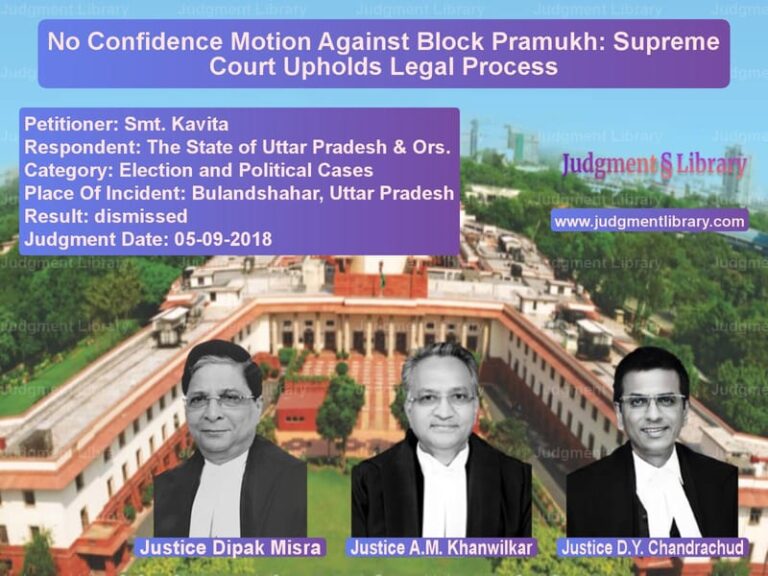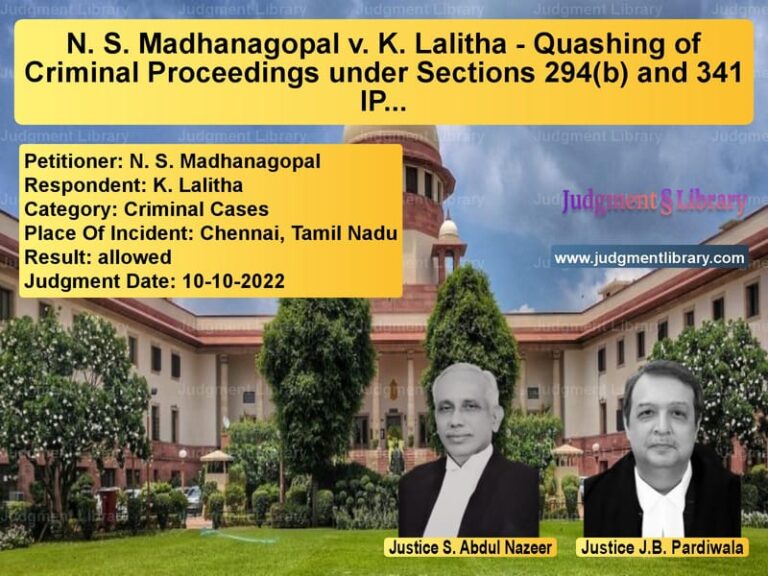Supreme Court Orders Appointment of Candidate Denied Job Over Vocational Qualification
The Supreme Court of India recently ruled in Union of India v. Uzair Imran & Others, addressing the wrongful denial of appointment to a candidate selected for the post of Postal Assistant. The dispute arose when the candidate’s eligibility was questioned due to his vocational qualification, even though he had cleared all required tests and was initially selected.
Background of the Case
The case concerned the selection process for Postal Assistants in the Lakhimpur Kheri postal division of Uttar Pradesh. The selection process was conducted in 1995 under the Department of Posts (Postal Assistants and Sorting Assistants) Recruitment Rules, 1990 (“1990 Rules”).
The key events were as follows:
- The recruitment notification required candidates to have completed the 10+2 standard or 12th class pass from a recognized board.
- The selection process included a written examination, typing test, aptitude test, and interview.
- The respondent, Ankur Gupta, was among the top-ranked candidates and was sent for pre-induction training starting on March 15, 1996.
- However, on March 22, 1996, the Chief Post Master General issued a directive stating that candidates who had passed 10+2 in the vocational stream would be disqualified.
- As a result, Ankur Gupta’s training was halted, and he was denied appointment.
The affected candidates challenged the decision before the Central Administrative Tribunal (CAT), which ruled in their favor. The Tribunal directed the authorities to send them for long-term training and appoint them upon successful completion.
The Union of India challenged the Tribunal’s order in the Allahabad High Court, which upheld the Tribunal’s decision. The government then filed an appeal before the Supreme Court.
Legal Issues Raised
- Whether the exclusion of vocational stream candidates was legally valid when it was not mentioned in the recruitment notification.
- Whether the March 22, 1996 directive could override the statutory recruitment rules.
- Whether a candidate’s eligibility could be questioned after the selection process was completed.
- Whether the Union of India had the right to rectify a mistake in the selection process after publishing the merit list.
Arguments by the Appellants (Union of India)
- The amended 1990 Rules, which excluded vocational stream candidates, came into effect before the recruitment process started.
- Any appointment made in violation of the amended rules would be void ab initio.
- The directive of March 22, 1996, merely clarified the rule and was not an arbitrary decision.
- The High Court erred in failing to recognize the legal validity of the amendment.
Arguments by the Respondents (Selected Candidates)
- The recruitment notification did not specify that vocational stream candidates were ineligible.
- Exclusion after completing the selection process violated principles of fairness and non-arbitrariness.
- The candidates had been officially selected, trained, and were awaiting long-term training when the exclusion directive was issued.
- The recruitment process could not be altered retrospectively to introduce new disqualifications.
Supreme Court’s Observations
The Supreme Court examined whether the government’s directive could retrospectively disqualify candidates. The Court made the following key observations:
- The 1990 Rules were amended and excluded vocational stream candidates, but this amendment was not reflected in the recruitment notification.
- The government had allowed vocational stream candidates to participate in the selection process without any objections.
- The selection process included written exams, aptitude tests, and interviews, all of which the respondents had successfully cleared.
- The directive of March 22, 1996, was a policy clarification and could not be applied retrospectively to deny appointment.
- The principle of “changing the rules of the game after it has started” was not permissible in recruitment matters.
The Court referred to past rulings, including:
- Malik Mazhar Sultan v. U.P. Public Service Commission (2006) – Recruitment rules in an advertisement must conform to statutory rules.
- Ashish Kumar v. State of Uttar Pradesh (2018) – Clarified that statutory rules take precedence but must be communicated clearly.
- Vineet Kumar v. State of Uttar Pradesh (2020) – Held that a candidate’s selection could not be invalidated if they met the published eligibility criteria.
Final Judgment
The Supreme Court dismissed the appeal and upheld the Tribunal’s decision, directing that:
- Ankur Gupta must be offered appointment as a Postal Assistant within one month.
- If no vacancy exists, a supernumerary post must be created.
- His service will be regularized upon successful completion of probation.
- He will not be entitled to back wages but will receive full service benefits from the date of appointment.
- His retirement benefits must be calculated as if he had been appointed with his original batch.
Implications of the Judgment
The Supreme Court’s ruling reinforces important principles in public sector recruitment:
- Recruitment notifications must be clear: Any amendments in eligibility criteria must be explicitly mentioned.
- Rules cannot be changed mid-process: A candidate cannot be disqualified after successful selection.
- Fair treatment of selected candidates: Once a candidate is selected and trained, they have a right to fair treatment.
- Protects candidates from arbitrary decisions: The judgment ensures government authorities cannot arbitrarily reject selected candidates.
The ruling strengthens employment rights and ensures that government recruitment processes remain transparent and fair.
Petitioner Name: Union of India.Respondent Name: Uzair Imran & Others.Judgment By: Justice Bela M. Trivedi, Justice Dipankar Datta.Place Of Incident: Uttar Pradesh, India.Judgment Date: 11-10-2023.
Don’t miss out on the full details! Download the complete judgment in PDF format below and gain valuable insights instantly!
Download Judgment: union-of-india-vs-uzair-imran-&-others-supreme-court-of-india-judgment-dated-11-10-2023.pdf
Directly Download Judgment: Directly download this Judgment
See all petitions in Recruitment Policies
See all petitions in Public Sector Employees
See all petitions in Employment Disputes
See all petitions in Judgment by Bela M. Trivedi
See all petitions in Judgment by Dipankar Datta
See all petitions in dismissed
See all petitions in Modified
See all petitions in supreme court of India judgments October 2023
See all petitions in 2023 judgments
See all posts in Service Matters Category
See all allowed petitions in Service Matters Category
See all Dismissed petitions in Service Matters Category
See all partially allowed petitions in Service Matters Category







